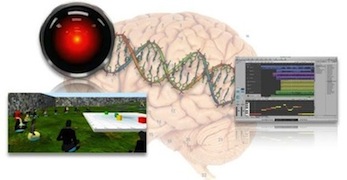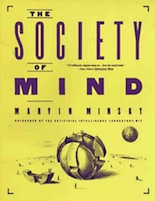Brains, Minds, and Computers

Questions
Here are some questions to motivate the study of mind and brain:
- What is a brain? What is a mind? How does the physical brain give rise to something so seemingly ethereal as a mind?
- Is a brain a computer? Is a computer a brain? What is a computer anyway?
- What are thoughts? Do thoughts come from the brain or the mind or both?
- Where does consciousness come from?
- Does free will exist? Is it even possible?
- Can we program computers to understand language like a human? Can we program computers to be self-aware, conscious, or sentient?
Sources
Start your study by browsing, reading, or watching the following:
- Wikipedia’s Mind and Brain Portal
- TED Playlist How does my brain work?
- Searle’s Minds, Brains, and Science
- Chapters 11 and 12 of Hofstadter’s Gödel, Escher, Bach
- Minsky’s The Society of Mind
- Eric Baum’s What is Thought?
- Steven Pinker’s How the Mind Works
- Ray Kurzweil’s How to Create a Mind: The Secret of Human Thought Revealed
The Mind-Body Problem
This Mind-Body Problem asks how the mind and body are related, or how mental and physical properties are related. It has a long history and you could spend millions of hours reading about it.
You can also read the Wikipedia article on the topic and read about Dualism and Monism at the Stanford Encyclopedia of Philosophy.
Approaches
While it may be an oversimplification to say there are two main approaches, there are two main approaches:
- Dualism: The mind and brain are both fundamental but radically different kinds of things.
- Substance dualism: The mind is made up of something beyond the laws of physics.
- Property dualism: The mind is of this universe but cannot be explained by the laws of physics.
- Predicate dualism: The predicates used to describe the mind cannot be reduced to those used to describe the brain.
- Monism: The mind and brain are both of the same kind of thing.
- Physicalism: The mind is just matter and energy “organized” a certain way.
- Idealism: Only the mind exists; the brain (and all matter) is just an illusion.
- Neutral Monism: The mind and brain are both derived from some other essence.
Views
So who says what about this famous “problem”? Do some research.
Here’s an excerpt of a Thinking Allowed interview with John Searle in which the problem is brought up:
Musing on the mind-body problem may seem like a useless philosophical endeavor. What a waste of time. But insights into the brain and mind help us deal with people’s physical and mental illnesses better, and maybe help us unlock abilities we didn’t know we had, or be more creative, or understand where alturists and criminals are coming from. And to gain these insights, we could philosophize, do field research and clinical studies, or we can try building minds and brains.
Minsky’s Society of Mind

Years of working in AI Labs building robots and similar systems led Marvin Minsky to claim that the mind is best viewed as a society of (highly specialized) mindless agents.
The interactions of all these components give rise to what we call the mind. The many chapters of the book discuss mental processes such as recognizing objects in a scene; planning, achieving, or giving up on goals; resolving competing desires within the mind; learning; understanding; and using language.
He covers emotions, common sense, reasoning, intention, ambiguity, humor, knowledge, metaphor, thought, freedom of will, and consciousness.
Where did the ideas come from? From work in the laboratory, building robots:
It was this body of experience, more than anything we learned about psychology, that led us to many ideas about societies of mind.
Note that this comment is not saying anything negative about psychology; he is saying psychology at the time did not include “building robots” as part of its culture. It does now.
Baum’s Computational Explanation of Thought

In What is Thought?, Baum asks “how [can] the computational events that take place within the spatial boundaries of your brain be accounted for by computer science?”
.
.
.
.
.
.
.
Hofstadter on Brains, Minds, and Thoughts

Hofstadter’s influential book Gödel, Escher, Bach is, in its author’s words, "a very personal attempt to say how it is that animate beings can come out of inanimate matter. What is a self, and how can a self come out of stuff that is as selfless as a stone or a puddle?"
Chapters 11-13 in the text, and the accompanying dialogues, address the topics of brains, minds, thoughts, semantics, levels of understanding, and computer systems. Here is a summary of his main points:
Levels of Description
TODO
Brains and Thoughts
TODO
Minds and Thoughts
TODO
Cognition
In addition to philosophy, neuroscience, and computer science, a lot of brain and mind research has come from cognitive science, cognitive psychology, and evolutionary psychology. Here are some great sources in these areas:
- Fundamental Principles of Cognition by Harry Foundalis
- Is Human-like Cognition a Fluke or a Trend of Evolution? by Harry Foundalis
- Index page to a set of articles by Harry Foundalis
- Wikipedia article on Cognitive Science
- Practically any article, book, or video by Steven Pinker.
Foundalis’s exposition of the fundamental principles of cognition is a great starting point. Among the highlights of his presentation:
- Foundalis proposes 6½ fundamental principles with short names Categorization, Analogy Making, Pattern Completion, Occam’s Razor, Numerosity Perception, Hebian Learning, and Learning by Forgetting.
- The "mother of all cognition problems" is pretty interesting.
- Category formation and object identification are unified.
- Cognition likely evolved because the universe is structured somehow: “‘Strict constructivism’ — the philosophical view that denies the existence of objects outside an observer’s mind — cannot explain the origin of cognition.”
- Distilling the essence of something is done by making analogies. We spontaneously and subconsciously "match cores" of things.
- This is probably where Plato got his "essences" from.
- Object prediction / pattern completion evolved a long time ago; it helped creatures to avoid getting eaten in situations where one could only see part of a predator.
- Occam’s Razor is not just a rule of thumb, it is a completely justified principle and deeply related to cognition.
- Animals unable to apply Occam’s Razor in identifying predators and food sources wasted time on useless theories and did not live long.
- "his razor is a fundamental principle of human cognition — and most likely even of animal cognition — since time immemorial. Without it we wouldn’t understand the structure of the world."
- When we have more compact descriptions, we can represent more information.
- Numerosity perception is not mathematics: several species can estimate quantities; humans can cheat by counting.
- Our cognitive estimation apparatus is very neatly modeled by an accumulation metaphor in which probability distributions are generated.
- Humans can deal with abstract representations of quantity, namely numerals (is this unique to our species?).
- (Hebbian) learning by association works over time; there can be mistakes along the way, but things get smoothed out over time — the wrong connections fade over time because they are rare (i.e., forgetting is a natural component of learning).
Although cognition emerged as an evolutionary property of biological organisms, it stands alone as a discipline, independent of its biological underpinnings. — Harry Foundalis
Brain Science and Computing
Here’s an old, but still relevant talk from 2003 by Jeff Hawkins. Notice how he cites Thomas Kuhn around 3:07. Note also how he insists that the study of the brains should be part of AI.
Here’s Kwabena Boahen talking about some of the differences between the brain and electronic computers, and a bit on how he’s working to engineer silicon computers to work similar to the way brains work:
Don’t miss this one:
These mirror neurons might make you think of the human capacity for empathy? What is empathy? Is it always a good thing? Before you answer yes, read this article.
There are dozens more TED Talks on the brain and mind. Start with any one and follow the "What to Watch Next" or "What’s Related" links.
Collective Brains
Here’s a thought. Perhaps individual silicon-based power-hungry computers of the early 21st century don’t act like brains and, if intelligent at all, have a seemingly different kind of intelligence from humans.
But what about massive computer networks? Can a collective intelligence emerge?
First check out this old (from 2007) but good talk by Kevin Kelly:
Now, do some research on the whole Singularity thing. What can you find about machine consciousness, collective brains, human bioenhancement, brain-computer interfaces, and the like? Here’s Kurzweil answering a couple questions on bigthink:
And check out this short post on the metaweb from NovaSpivak.com, too.
Have fun searching for more!